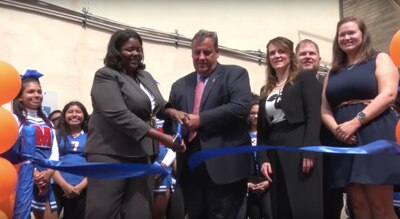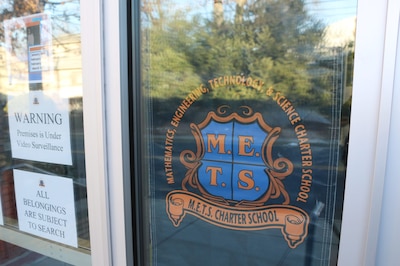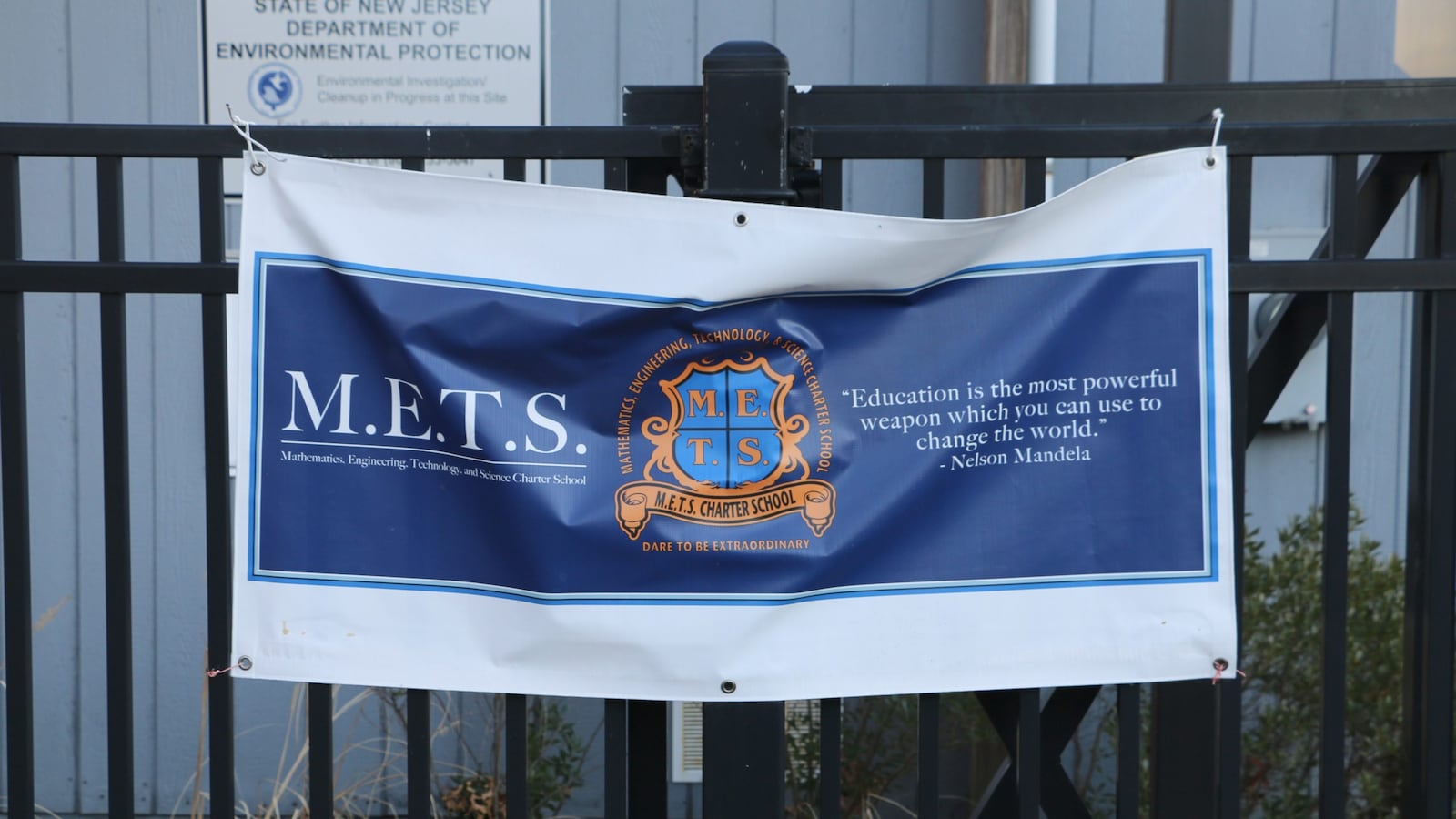The grand opening of M.E.T.S. Charter School in Newark was a joyous occasion.
Cheerleaders applauded as then-Gov. Chris Christie cut a big blue ribbon alongside school leaders on that sunny day in August 2017. It was a chance for Christie to herald the promise of charter schools — the publicly funded, independently operated schools that he championed as a lifeline for students stuck in struggling traditional schools — just a few months after his administration had closed three Newark charter schools for poor performance.
The celebration was short-lived.
The day after the ribbon-cutting, M.E.T.S. held a contentious board meeting at its original campus nine miles away in Jersey City. Teachers there complained about staffing shortages and impossible workloads, including one educator with a roster of 120 students spread across multiple grade levels, according to minutes from the meeting. Daniel Urbankowski, a veteran social studies teacher, told the board that M.E.T.S. should focus on improving its Jersey City school before adding new ones.
“We’ll keep delaying our inevitable closure,” he said, “rather than building an effective institution.”
His warning proved prescient. Last week, in a damning seven-page letter, the state education chief ordered M.E.T.S. to close its two schools at the end of this school year.
While that verdict stunned the school communities, M.E.T.S.’s downfall was years in the making, according to a review of public records and interviews with students, staff members, and a former board member. The operator faced investigations into possible nepotism and fiscal malfeasance soon after launching its first school in 2011. Since then, the network — which spans grades 6-12 in Jersey City and grades 9-12 in Newark — continued to churn through leaders, grapple with low test scores, and fall short of its enrollment goals, while the Newark campus struggled to maintain order and keep students safe.
Yet even as the state put M.E.T.S. on probation multiple times, officials allowed the network to continue operating and even expand.
Prodded by the state, the schools took steps to improve. This year, a popular new lead administrator and a new principal led reforms at the Newark campus that left people at the school believing it had finally turned a corner. Yet the changes came too late to stave off closure. Now the network’s roughly 700 students — almost all black or Hispanic — must find new schools for the fall.
The network’s current leader, board president, and attorney did not respond to a request for comment for this article. But lead administrator Damion Frye said in a letter to the school community last week that he still believed M.E.T.S. “has become a great place for students to learn in a progressive, safe and innovative environment.”
Nearly 90 operators run charter schools in New Jersey, and many are thriving in Newark and across the state. Advocates attribute those schools’ success partly to the high standards set by the state education department, which oversees charter schools.
“The charter office has a very rigorous oversight process to make sure that every single charter school in the state is of high quality,” said Harry Lee, president of the New Jersey Charter Schools Association.
But critics say the turmoil at M.E.T.S. is evidence that the Christie administration’s rush to approve new charters opened the door to some ill-equipped operators. As of last year, the state had shuttered nearly 40 troubled charter schools and put others on probation.
“This illustrates a legacy of the Christie years, in which there was an effort to rapidly grow charter schools,” said David Sciarra, executive director of the Newark-based Education Law Center, which has gone to court to stop the spread of charter schools, arguing that they drain resources from traditional public schools. “What you wound up with is a number of providers who continue to struggle in one form or another.”
The first school launches, and investigations follow
M.E.T.S. opened its doors on a tide of optimism.
Backed by parents in Jersey City, a group of seasoned educators pitched the combined middle-and-high school as an alternative to the city’s traditional schools, one that would deliver a top-notch education.

“We expect the school to become a national model for teaching math, engineering, technology, and science,” said John Sico, Jr., a former Paterson schools official and one of M.E.T.S.’s co-founders, when the school opened in 2011. Three of Sico’s sons also worked for M.E.T.S.: Michael handled the finances, Daniel oversaw facilities, and Steven provided legal services, according to a 2014 state report and public records.
Barely a year after the Jersey City launch, the school ran into trouble.
State rules prohibit schools from hiring relatives of board members or chief administrators without the approval of county officials. In 2012, state investigators began looking into whether M.E.T.S. had violated those nepotism rules. After the investigation, whose findings the school appealed, M.E.T.S. eliminated the position Daniel held, and Michael and Steven stepped down from their roles, according to a 2013 state document, which said those actions put the school in compliance with state rules. (Michael stayed on for a time as human resources manager.)
More allegations followed. In October 2013, the state Office of Fiscal Accountability and Compliance, or OFAC, launched an investigation into the school’s finances. By Christmas Eve, the state decided the preliminary findings were so troubling that it put the school on probation.
OFAC detailed its findings in a scathing 29-page report the following April. It found that M.E.T.S. had agreed to pay $900,000 per year to sublease a school building from an intermediary group that rented the space for just over $527,000. The building owner told investigators he would have leased the space directly to M.E.T.S., sparing it from paying the exorbitant fee to the intermediary group, called Friends of M.E.T.S. Charter School, the report said. As a result of the investigation, M.E.T.S. terminated its agreement with the intermediary group.
The report also found that M.E.T.S. paid tens of thousands of public dollars to vendors that the school could not verify provided any services — or even existed. (Investigators cited a “preponderance of evidence” for their finding, but could not prove beyond any doubt that no services were provided.) The school also failed to comply with purchasing and record-keeping rules, the report claimed.
The investigation “confirmed that M.E.T.S. administrators and business office staff abrogated their responsibilities to ensure funds were expended in an effective and efficient manner,” the report said.
In the wake of the report, the state ordered M.E.T.S. to create a “corrective action plan” and pay back nearly $172,000 in public money that OFAC determined had been improperly spent, according to a 2014 state letter that said M.E.T.S. had been able to defend a few questioned purchases. A state spokesman confirmed that M.E.T.S. repaid the full amount.
Michael Sico, the former M.E.T.S. business administrator and human resources manager, told Chalkbeat that he had not seen the OFAC report, which was issued after he left the school in late 2013. When Chalkbeat described aspects of the report to him, he called the findings “false allegations” and said documents exist that could have refuted the findings. “It’s wrong — we can prove it’s wrong,” he said.
Sico said the school faced allegations of nepotism but no charges, and that the issue was resolved when he and his brother resigned from their positions. No one in the Sico family was connected to the Friends of M.E.T.S. group that charged the inflated rent fees, he added. And any payments he made to vendors were approved by the board and properly documented while he was at M.E.T.S., he said, adding that his family is not responsible for the school’s actions after their departure.
“While I was there, I followed all the rules and regulations,” he said. “My audits were clean.”
By early 2014, the Sicos had left M.E.T.S. and new leadership was in charge. But past problems lingered: Auditors in 2014 and 2015 found expenditures that lacked the proper documentation, and the Jersey City school remained on probation.
Yet, in 2015, the state agreed to renew the school’s charter. Just a couple of years later, M.E.T.S. decided it was ready to expand.
Despite risks, a new school opens in Newark
M.E.T.S. was hardly in the clear when it opened the Newark high school in 2017.
The Jersey City campus was struggling to boost enrollment and retain its teachers who, on average, had worked at M.E.T.S. for just 1.5 years. And while the Jersey City high school had recently moved into the state’s top tier of charter schools, based on test scores and other metrics, its middle school was stuck near the bottom of the pack.

Despite the risks, Gov. Christie’s administration signed off on M.E.T.S.’s expansion into Newark. Then the problems began piling up.
M.E.T.S.’s leadership now had to oversee a second school in a separate city, with some staffers shuttling between campuses. Housed in a shared building, the Newark school took in students from the three local charter schools the state had recently shut down, creating a challenging dynamic as displaced students — some in their junior or senior of high school — wound up together in the same new school.
“It was a big mess to begin with,” said a current teacher at the Newark campus, who, like others interviewed, requested anonymity to avoid retaliation. “It was a ticking time bomb.”
Not long after the school’s launch in August 2017, administrators reported daily fights and a student spraying a classmate with mace. That October, a student brought a loaded handgun to the campus, forcing the school to cancel classes for a few days. Less than two weeks later, the M.E.T.S. board of trustees voted to immediately “remove” all ninth- and 10th-grade students from the Newark campus and to close the entire school at the end of the academic year.
Publicly, M.E.T.S. leaders said the school wasn’t equipped to provide a high-quality education. But M.E.T.S. also had a financial reason to oust the students: The Newark campus had exceeded its state-approved enrollment, which meant the school was serving more students than it was getting paid for, according to former M.E.T.S. board member Richard Borkowski.
“The decision to [remove the students] was strictly financial related to this over-enrollment issue,” he said. “I kept saying, ‘This can’t be legal.’”
The state apparently agreed. It blocked the transfer plan, saying in a letter to M.E.T.S. that a charter school cannot unilaterally remove a group of students from its roster, and put M.E.T.S. on probation. Soon after, the network’s lead administrator resigned.
The chaos in Newark continued. Staffers complained that the principal provided little structure or guidance, while students who broke the rules were subjected to harsh punishments, according to teachers. The M.E.T.S. network reported 240 out-of-school suspensions the first year the Newark campus was open, compared to just 31 the previous year in Jersey City, according to the state. Last school year, the Newark campus — which enrolled about 260 students — issued 309 out-of-school suspensions. (The Jersey City campus gave out 50.)
The school’s problems persisted into its second year. Parents and students complained to the state about the lack of order. On one occasion, the school canceled classes and sent everyone home early after multiple fights erupted on campus, according to a teacher and a student.
“Mostly students ran the school, instead of the staff,” said Jose Gonzalez, an 11th-grader at the Newark campus. “There were a lot of fights and commotion. Nothing was in order.”
The state removed the school from probation in 2018, but officials caught wind of the subsequent commotion. They saw reports about violent incidents at the Newark school and learned that just six of 40 seniors were expected to graduate on time last year, according to a 2019 state letter to the school.
Last April, state and local officials made a surprise visit to the Newark campus. They found weak teaching and out-of-control classrooms, according to the letter. One teacher recalled a student muttering under his breath as the visitors passed through. “Shut us down,” the young man said.
That month, the state put M.E.T.S. back on probation.
A push for improvement falls short
The sanction could hardly have come at a worse time for M.E.T.S. In just a few months, the network would have to apply for state approval to continue operating.
If M.E.T.S. had any chance of surviving, it would have to make major changes — and fast.

The leadership submitted an improvement plan to the state and began revamping school policies. To establish order at the Newark campus, M.E.T.S. hired additional counselors and a new security company, began collecting student cellphones, and partnered with an outside group to develop less punitive ways to respond to student misbehavior. To boost student achievement, M.E.T.S. hired teacher coaches, adopted new online tests to track student progress, and pushed for more engaging, project-based lessons.
M.E.T.S. also hired a new principal for Newark and found the school a new home. For the first time, the Newark campus had its own building with a gym and even a courtyard where students played volleyball during lunch and hung out in the evenings during school-sponsored movie nights.
The person overseeing the overhaul was Damion Frye, the schools’ new lead administrator. A former teacher who arrived at M.E.T.S. in 2018, he earned the trust of many staffers as he worked closely with the M.E.T.S. teachers union. It didn’t hurt that he often brought in coffee and bagels to show the staff his appreciation.
Before this school year, the Newark students felt “unhappy” and “unsafe” and many teachers considered quitting, teacher Samantha Montani wrote in an email to Chalkbeat. But lately, the campus had felt transformed due to the hard work of Frye, the new school leadership, and the staff, Montani said.
“They rolled up their sleeves, put on their boots, and began the work of making the school a better place,” she wrote. “If you walk into our home now, it’s joyful.”
Some students at the Newark school agreed.
“We have better teachers, we have a great principal,” said 11th-grader Paul Aguirre. “I just like it way better than other years.”
Yet the path to improvement was bumpy. M.E.T.S. briefly had to bus students off-campus this fall while it scrambled to get the new Newark building in order. And at a board meeting in September, staffers complained that the flurry of policy changes had led to a chaotic, overwhelming start of the school year. “It’s never been this bad,” a counselor said at the meeting.
Meanwhile, state monitors continued to raise alarms. During school visits throughout the fall and into January, they observed some high-quality lessons at the Jersey City high school, according to the state’s letter to the school this month. But at the middle school and the Newark high school, teachers set a low bar for students with lessons that demanded little deep thinking, the letter said. The low-level lessons helped fuel disruptions, as students talked over teachers and walked out of classrooms, the observers found.
The observations added to the state’s ongoing concern about the schools’ shaky finances, with lower-than-expected enrollment leading to budget shortfalls, and its unstable leadership, according to the state letter. In the 2017-18 school year, students in most grades performed worse on state tests than their peers in the surrounding traditional schools, the state said; last school year, the results were mixed, with some grade levels making gains while others slipped.

By the beginning of this month, state Education Commissioner Lamont Repollet had made up his mind: both M.E.T.S. campuses must close. The available evidence, he wrote to the network on Feb. 3, “strongly suggests it is unable to provide students with a consistent high-quality education.”
The next day, Frye sent the letter to the M.E.T.S. community saying the network’s leadership was “heartbroken” by the state’s decision. He promised the network would provide students with counseling and help them enroll in new schools for the fall.
The news sent shockwaves through both campuses. Staffers in Newark felt the state had ignored the many improvements they made, while some in Jersey City felt their school had been unfairly lumped in with the more troubled Newark campus.
Urbankowski, the social studies teacher who warned about the risk of closure in 2017, said Frye and staff members had fixed many of the problems that once plagued the Jersey City campus. “That’s really what made it most shocking” to learn both campuses would be closed, he said.
Rosemarie Rosado, an 11th-grader in Jersey City, said many of her classmates cried when they heard the news.
“How they’re trying to portray us — saying we’re bad students, the way we behave — it’s not true,” she said. “I grew up with these people. I was expecting to graduate with them.”
In Newark, the news rippled through the hallways of a building that has now housed two charter schools that the state has shuttered due to poor performance: Lady Liberty Academy and M.E.T.S. After classes let out last week, students tried to make sense of their school’s fate. Several said they will miss M.E.T.S. and are worried about where they will end up. But others said they understood the state’s decision.
“It’s definitely improved — but it’s not enough,” said 11th-grader Bryan Romero. “A lot of these kids aren’t getting a proper education.”
Devna Bose contributed reporting.


